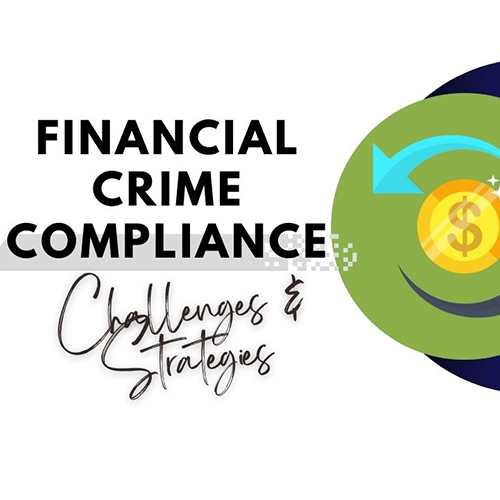A Financial Crime Compliance (FCC) program, also known as an anti-money laundering (AML) program, is crucial for mitigating financial crime risks and ensuring alignment with laws and regulations. Enhancing the efficiency of FCC programs helps minimize risks, reduce costs, and improve effectiveness in preventing financial crimes, thereby protecting the organization's reputation and maintaining trust.
A Financial Crime Compliance (FCC) program, also called the anti-money laundering (AML) program, ensures alignment with applicable laws, regulations, policies, and standards and mitigates financial crime risks by checking unethical activities. FCC programs play a critical role in safeguarding the integrity of financial systems globally.
Enhancing the efficiency of a financial crime compliance program is of utmost importance for organizations, as it helps them minimize risks, reduce costs, and improve their overall effectiveness in preventing financial crimes.
Moreover, a well-functioning and efficient FCC program also ensures compliance with regulations, protects the organization’s reputation, and maintains the trust of customers and stakeholders.
This blog shares the top five key strategies to enhance the efficiency of financial crime compliance programs.
5 Key Strategies to Boost the Efficiency of a Financial Crime Compliance (FCC) Program
The following strategies can help improve the efficiency and effectiveness of a financial crime compliance program:
1. Improve Data Quality
Regulatory compliance programs require accurate data and a balance between data quality and time spent in data gathering. To improve data quality, financial institutions need to focus on the following:
- Conduct formal data assessment to understand what data you collect, store, and process
- Review and audit data for accuracy, completeness, quality, consistency, relevance and timeliness
- Define data quality standards and parameters
- Eliminate data silos
- Implement robust data governance
2. Use Advanced Analytics
Advanced analytics can enhance the effectiveness and efficiency of financial crime compliance programs. It helps:
- Process large amounts of data in near real-time
- Enable faster and more accurate identification of suspicious activities
- Reduce false positives and focus on high-risk activities
- Enhances the ability to identify emerging risks and adapt to changing patterns of financial crimes
- Integrate various data sources, both internal and external, to gain a holistic view of potential risks and threats
- Allocate resources effectively and prioritize their efforts
It further helps implement the following to identify complex patterns and relationships between entities, transactions, and behavioral patterns that humans may fail to notice:
- Predictive modeling
- Network analysis
- Artificial intelligence (AI)/Machine learning (ML)
- Natural language processing
3. Risk-Based Approach (RBA)
With a risk-based approach, financial institutions can assess and understand the money laundering and terrorism financing risks to which they are exposed and take the necessary measures to mitigate them.
Financial institutions can refer to the Financial Action Task Force’s (FATF) specific guidance for risk-based approach (RBA) in financial institutions to combat financial crimes, such as money laundering, financing of terrorism, proliferation of weapons of mass destruction, and meet the financial crime compliance. These include:
- Assigning resources and organizing internal controls to dissuade and detect financial crimes
- Risk Assessment to identify and understand the money laundering and terrorist financing risks to your business and/or jurisdiction
- Rigorous Customer Due Diligence (CDD) and Enhanced Due Diligence (EDD) for higher-risk customers
- Continuously monitor customer transactions and relationships to detect PEPs, and suspicious activities and update risk assessments as necessary
- Train and educate staff about the risk-based approach (RBA) and AML/CTF obligations
4. Skill Development – Continuous Upskilling and Reskilling
A skilled, well-trained, and knowledgeable team is the backbone of compliance monitoring. Maintaining compliance while simultaneously upskilling and reskilling the workforce enables financial institutions to:
- Stay competitive
- Ensure sustainable growth
- Adapt to emerging market trends
- Maintain compliance with continuously evolving regulatory standards
However, upskilling the workforce requires substantial time, resources, commitment, and patience. With digital learning or e-learning solutions, such as Fluent, financial institutions can transform their talent and knowledge base effectively.
5. Streamlining Processes and Automation
Streamlining processes and automating manual tasks is another crucial step toward enhancing the efficiency of financial crime compliance programs. By identifying and eliminating unnecessary and redundant steps with automation, organizations can optimize and streamline compliance processes.
Leverage automation to:
- Automate repetitive tasks such as filing Suspicious Activity Reports (SARs), customer due diligence, transaction monitoring, etc.
- Reduce manual efforts and human errors
- Free up resources for more strategic activities
Conclusion
Enhancing the efficiency of financial crime compliance is an ongoing journey. In a world where financial crime knows no borders, an efficient compliance program becomes an indispensable shield, safeguarding the ethical core of businesses and preserving the integrity of transactions.
Anaptyss offers comprehensive financial crime compliance and fraud prevention solutions that are tailored to the needs of banks and financial institutions. With deep domain expertise and ALFA, an AI/ML-powered solution, Anaptyss helps strengthen anti-money laundering (AML) and compliance capabilities.
Want to learn more about how to to enhance the efficiency of financial crime compliance programs? Connect with us: info@anaptyss.com.


















